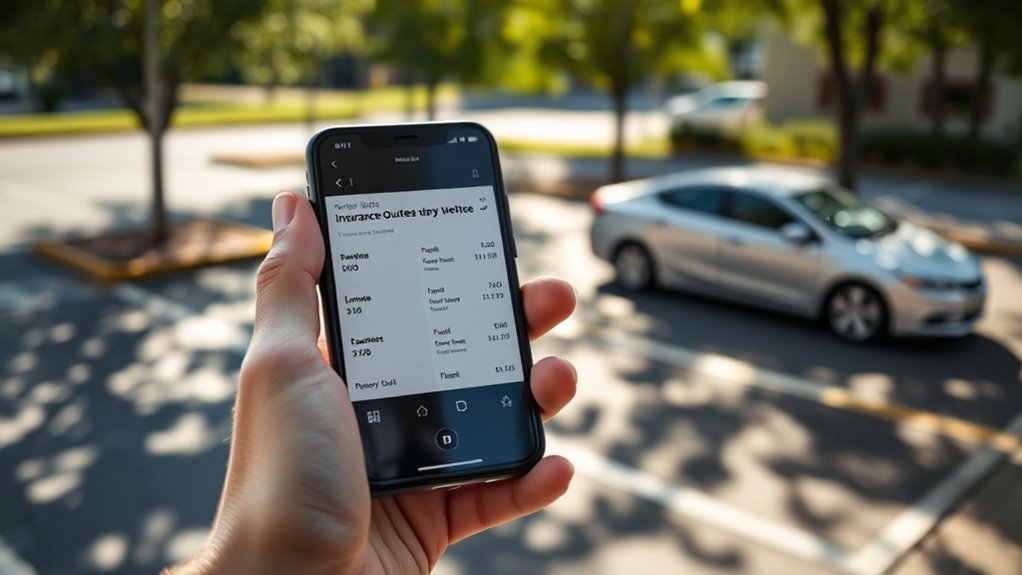
If you've recently received a ticket, it's essential to understand how it could impact your insurance costs. Insurance rates can fluctuate considerably based on various factors, including your driving history. By employing specific strategies, you can potentially mitigate these financial repercussions. From comparing quotes to exploring defensive driving courses, each approach offers unique benefits. But, which methods will truly make a difference in your specific situation? Let's explore the most effective strategies.
Key Takeaways
- Compare insurance quotes from multiple providers, as rates can vary significantly after receiving a ticket.
- Complete a defensive driving course to potentially earn discounts of 5% to 20% on your premiums.
- Consult a traffic attorney to navigate legal complexities and possibly reduce or dismiss your ticket.
- Raise your insurance deductibles, which can lead to lower monthly premiums while ensuring you have an emergency fund.
- Enroll in safe driving programs to monitor your habits and qualify for discounts based on your driving behavior.
Compare Insurance Quotes After Receiving a Ticket

When you've received a speeding ticket, it's important to compare insurance quotes to mitigate potential rate increases. A single speeding ticket can hike your insurance rates by about 22%, so understanding how different insurers assess risk is vital. Choosing the Right Traffic Attorney can also help you contest the ticket and potentially avoid the rate increase altogether. Quotes can vary greatly, so make sure you're comparing policies with the same coverage levels for accuracy. Companies like State Farm and Union Mutual often provide competitive rates for drivers with tickets. Remember, the impact of a ticket can last three to five years, so it's wise to get quotes early—ideally at least 45 days before your renewal. Additionally, average insurance cost after a speeding ticket is $2,591/year, highlighting the importance of finding the best rates. Don't forget to reflect on available discounts and customer service ratings when making your decision. This approach will help you find the most affordable insurance solution.
Complete Defensive Driving Courses for Potential Discounts
Receiving a speeding ticket can be stressful, but taking proactive steps can help you manage your insurance costs effectively. One of the most beneficial actions is completing a defensive driving course.
Depending on your state, these courses can offer discounts ranging from 5% to 20% off your car insurance premiums. Many courses last four to six hours and can be taken online or in-person, depending on your preference.
Completing the course not only enhances your driving skills and knowledge of traffic laws but may also help maintain a cleaner driving record. Verify you provide your insurer with the completion certificate to secure your discount.
Consult a Traffic Attorney for Legal Guidance
Consulting a traffic attorney can greatly impact your ability to manage the consequences of a traffic ticket. Their legal expertise guarantees you navigate the complexities of traffic laws effectively.
An attorney can negotiate plea bargains, potentially reducing charges or fines that would otherwise inflate your insurance rates. They gather evidence, such as challenging the accuracy of speed-measuring devices, to strengthen your defense.
Representation in court allows for a robust argument against the charges, which can lead to reduced penalties or even dismissal. By preventing increased insurance premiums and protecting your driving record, hiring a traffic attorney often proves to be a cost-effective strategy in the long run, outweighing the immediate expense of legal fees.
Raise Deductibles and Improve Financial Management

Maneuvering the complexities of insurance costs often involves a strategic approach to financial management, particularly through raising deductibles. Increasing your deductibles can reduce your premiums, shifting more financial responsibility to you.
For example, raising your auto insurance deductible from $500 to $1,000 may lead to substantial monthly savings. This approach requires maintaining a robust emergency fund to cover potential out-of-pocket expenses.
Additionally, improving your credit score can further lower premiums. Regularly reviewing your credit report and ensuring timely bill payments helps enhance your score.
Enroll in Safe Driving Programs to Monitor Driving Habits
Enrolling in safe driving programs not only enhances your driving skills but can also lead to significant savings on your insurance premiums.
Many insurers offer discounts for completing defensive driving courses, such as those from GEICO and the National Safety Council. By participating in these programs, you'll gain a thorough understanding of defensive driving techniques and hazard awareness, which are essential for reducing accident risks.
Additionally, apps from companies like Progressive track your driving habits, rewarding you for safe behaviors with potential savings averaging $146 annually.
Conclusion
In the intricate dance of insurance costs, steering your options can transform a ticket's burden into a manageable step. By comparing quotes, completing defensive driving courses, consulting a traffic attorney, raising deductibles, and enrolling in monitoring programs, you can paint a brighter financial picture. Each strategy acts like a brushstroke, crafting a masterpiece of savings. Embrace these tactics, and watch as the clouds of high premiums part, revealing the sunlit path to lower insurance costs.


